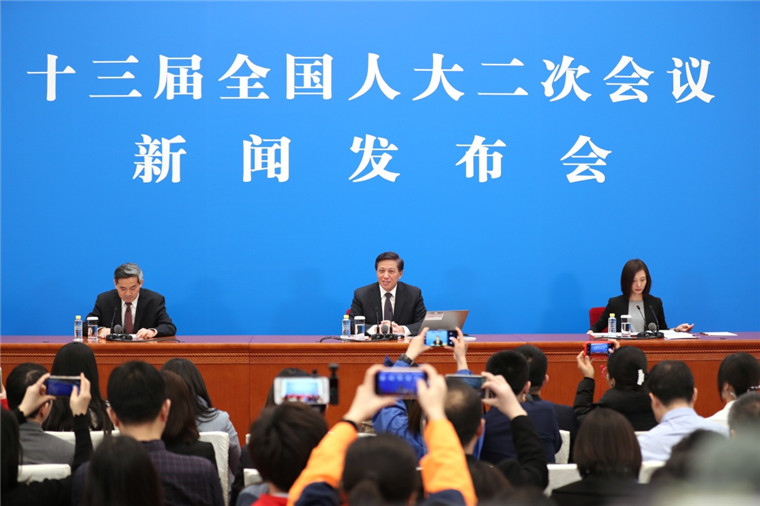
Zhang Yesui (C), spokesperson for the second session of the 13th National People's Congress (NPC), speaks during a press conference on the agenda of the session and the work of the NPC at the Great Hall of the People in Beijing, capital of China, March 4, 2019. (Photo by Jin Liwang)
By Li Jingxuan
BEIJING, March 5 (ChinaMil) -- One of the hottest topics among foreign media during China’s annual “Two Sessions”—National People's Congress (NPC) and Chinese People's Political Consultative Conference (CPPCC)—is China's defense spending.
Zhang Yesui, spokesperson for the second session of the 13th NPC, answered a question on China's defense spending raised by a reporter from the Bloomberg during a press conference held on the morning of March 4 before the “Two Sessions”.
Zhang pointed out that China maintains a reasonable and appropriate growth rate in its defense expenditure to safeguard national security and adapt to military reform with Chinese characteristics. While national defense spending in some major developed countries accounts for more than 2 percent of their Gross Domestic Product (GDP), the ratio for China in 2018 was only about 1.3 percent.
Zhang also stated very frankly that whether a country is a military threat to others is not determined by its increase in defense spending, but by the diplomatic and national defense policies it adopts. China's limited defense spending, which is for safeguarding its national sovereignty, security and territorial integrity, poses no threat to any other country.
As everyone knows, China is one of the countries with the largest number of neighbors and the longest land border in the world. Due to historical reasons, China and some of its neighboring countries still have disputes over territorial sovereignty and maritime rights and interests. In reality, "Taiwan independence," "East Turkistan independence", and "Tibetan independence", along with other separatist plots have not died down.
For a long time, China’s national security has been under heavy pressure. China's national defense expenditure exceeded RMB100 billion for the first time in 1999 and reached RMB1,106.951 billion last year. Against the backdrop of an ever-changing international situation and the steady increase of China's overall national strength, the moderate growth of China's national defense expenditure is reasonable and legal, and also goes with the trend and needs of the situation. It is very reasonable today because national defense and military reform is deepening and the building of a strong army is being implemented.
At the same time, to assess a country's defense expenditure, the absolute value is only one aspect; it is more important to assess the relative proportion. On a global scale, defense spending in most countries in the world accounts for 2.4-2.5 percent of their GDP.
Among them, the US and Russia are above 3 percent, while the NATO countries are explicitly required to keep military spending no less than 2 percent of their GDP. In terms of per capita national defense, the US ranks first at $2,210, then Russia at over $300, and China at $118. As for the defense expenses allocated to each soldier, the US is 6.7 times of China, and UK 4.5 times , Russia 3 times.
Whether a country poses a threat to other countries has nothing to do with its "muscle", but instead with where the "fist" will strike. As Senior Colonel Wu Qian, Spokesman for China's Ministry of National Defense (MND), said in a regular press conference in last October that China has been adopting a defensive defense policy and a military strategy which champions active defense. China is committed to the path of peaceful development and to provide more public security goods to the global community. The growth in China's military strength is absolutely a growth in peaceful strength of the world.
During the 40 years of reform and opening up, the number of Chinese troops was reduced from 6.03 million in 1980 to 2 million in 2018, a decrease of 4.03 million. In particular, the number of posts has been reduced by 2 million since 1985.
In stark contrast, since the first batch of military observers was dispatched to the UN peacekeeping operations in 1990, China had sent nearly 40,000 peacekeepers till 2018. This number made China rank first among the five permanent members of the UN Security Council.
Since the end of 2008, the Chinese Navy has sent more than 30 batches of fleets to the Gulf of Aden and the waters off Somalia for escort missions. Half of the ships under Chinese Navy escort are foreign vessels.
In addition, the Chinese military has also actively participated in international emergency humanitarian aid mission. China has sent medical teams to West Africa to fight Ebola, launched comprehensive search and rescue for the missing Malaysia Airlines Flight 370, and evacuated trapped personnel in Yemen.
All these actions have fully showcased Chinese military’s confidence and responsibility-assuming spirit, demonstrated that China is an important pillar of peace and stability in the region and the world as a whole.









